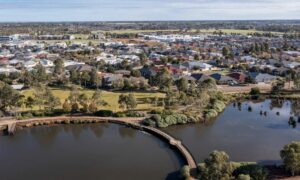All images courtesy of Rising Sun Pictures.
Award-winning visual effects studio Rising Sun Pictures (RSP) is celebrating its 25th anniversary this month.
Attributing their long-term success by sticking to their values and earning the trust of the world’s top film studios, this is a significant milestone for the studio that began in a studio in Adelaide.
From humble beginnings, RSP has gone on to produce ground-breaking work for more than 150 motion picture and series productions, including some of the most popular and critically-acclaimed films of the past two decades.
How has a mid-sized studio in Adelaide, South Australia managed to thrive for so long in an industry noteworthy for its boom-or-bust business cycles, rapidly evolving technology, and intense, international competition?
Tony Clark, company’s Co-Founder and Managing Director, sums it up in a single word, “Trust.”

Located halfway around the world from its studio clients, RSP has focused relentlessly on earning trust. “It’s about being honest and transparent in your relationships and building confidence over time,” Clark explains.
“It’s doing what you say you are going to do, doing it well and doing it consistently, year after year. We feel fortunate to have formed good-quality relationships with our clients. Many of them who were with us at the start remain our friends to this day.”
Clark and partners, Wayne Lewis and Gail Fuller, were fortunate in their timing when they formed RSP during a meeting at the Rising Sun Inn in suburban Adelaide in 1995.
The release a few years earlier of James Cameron’s Terminator 2: Judgement Day, the first studio film to feature a lead character produced with computer graphics, had sparked a boom in visual effects and created demand for new suppliers.
“There was a scarcity of resources and companies that could reliably deliver quality at a good price,” recalls Clark. “That created an opening and we worked diligently in those early years to fill it.”
After cutting its teeth on smaller and independent films, RSP made a breakthrough in Hollywood in 2001, when it was awarded work on Warner Bros’ Red Planet.
Impressing Warner Bros.’ production team with its ability to deliver high quality shots quickly, the studio soon began attracting work on other blockbusters, including The Lord Of The Rings: The Return Of The King, as well as key effects scenes for Harry Potter and the Goblet of Fire.
RSP worked on four more films in the Harry Potter franchise, as well as other key sequences in The Hunger Games, X-Men, and creating the lead character Charlotte in Charlotte’s Web.
In recent years, the studio has been called on to take the lead on ever-more technically- and creatively challenging effects sequences.
It shared an Oscar® nomination for its work in designing and executing the time-bending “Quicksilver Kitchen” scene from X-Men: Days of Future Past.
It also created the heart-stopping re-entry sequence featured in the final moments of Alfonso Cuarón’s Gravity (winner of the 2013 Academy Award for Best Visual Effects).
For 2019 Best Picture nominee Ford v Ferrari, the studio created a digital replica of Daytona International Speedway, as it appeared in 1966, and filled it with thousands of digital actors in period costumes.
Most recently, it has created eye-popping visuals for Marvel Studios’ Black Widow and Disney’s Jungle Cruise.
RSP’s Adelaide location has also contributed to its ability to retain staff.
While the city offers the conveniences of a large urban centre, it has a small-town vibe, an enviable climate and spectacular scenery.
For artists emigrating from Los Angeles or London, it’s also remarkably affordable.
The studio’s management has also encouraged longevity in its staff by fostering a sense of shared purpose.
As filmmakers themselves, they are motivated by the same passions as their artists.
“I think the loyalty comes from the fact that the company was established by people who love making films,” observes Sara Henschke, Inductions and Resource Administrator, who was part of the studio’s original staff.
As RSP embarks on its second quarter century, it is looking to evolve.
The entertainment industry is changing. With the growing popularity of streaming, the studio is taking on more series projects.
It also seeks out other opportunities. “We want to move outside our comfort zone,” says Cope.
“We want to innovate and push ourselves. There are a lot of interesting opportunities and as we find the right ones, we’ll run with them.”
Clark says that while that evolution and adaptation are crucial to RSP’s future, the studio will stay true to its founding principles.
“Companies like ours are only as good as their people,” he says.
“If you remove the people from RSP, you’re left with computers, and computers don’t make pictures by themselves. At the end of the day, we will continue doing what we’ve always done: produce high quality work that is memorable and moves audiences.”
























